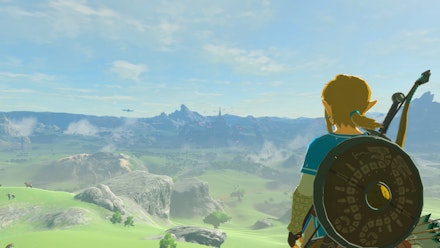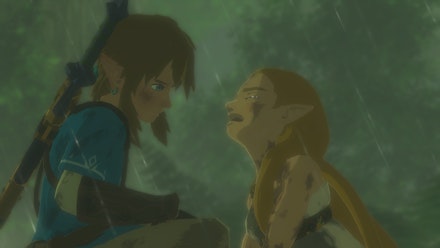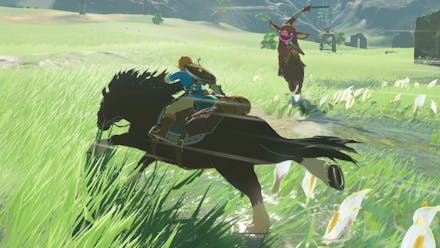The precise moment it becomes clear that Breath Of The Wild is not a traditional Zelda game, comes about two hours in. Having just acquired a rudimentary hang glider, you float down from the game’s tutorial plateau and set foot upon the plains of Hyrule proper. Hills and valleys reach out to the horizon, horses crop lazily at the grass and you, sword in hand, are left with no earthly idea what to do next.
Open world games are hardly unusual but the sheer insouciance with which this packs you off to write your own story is quite bewildering. You've been coached in the game’s core mechanics, bestowed with a Sheikah Slate (the Hyrulian equivalent of an iPhone 7), politely asked you to slay the game’s villain and sent on your merry way. How you choose to fill the next hundred plus hours of gameplay is, by and large, entirely up to you.

The lack of a rigid narrative might be a concern were the world not so enchanting. Gorgeously rendered in the game’s Ghibli-esque style, Hyrule is as stunning an environment as gaming has produced: more expansive than Skyrim’s, with a buzzing inner life. There are creatures to kill and catch, ingredients to gather, secrets to uncover and ancient shrines to explore. These shrines are the closest the game comes to traditional Zelda dungeons — each posing a puzzle that must be overcome with the aid of your abilities (remote bombs, magnetism, stasis and ice). The finding and solving of shrines quickly becomes compulsive, not least because they unlock fast travel nodes but also as a means to increase your stamina gauge and life hearts.
Each encounter is an experiment in creative slaughter.
The life meter becomes a concern quickly as Breath Of The Wild’s combat is painfully unforgiving. Since no area of Hyrule is off-limits, it’s entirely possible (in fact inevitable) that you will wander into a zone only to be flattened by an angry troll — the game’s only hint that you might want to pick another route. You will die in Breath Of The Wild and you will die a lot. It's a paradigm Dark Souls veterans will be all too familiar with but may come as a rude awakening for those used to the warm and fuzzy romps the franchise is known for.
Combat is further complicated by the impermanence of weaponry, all of which shatter after extended use, forcing you to improvise on the fly. Do you creep into that camp of slumbering Bokoblins and steal their weapons first? Send boulders rolling through their ranks? Use magnetism to hurl large metal objects? Or do something demented like attach explosives to a balloon and waft it towards them with a giant palm leaf. Each encounter is an experiment in creative slaughter, stoking the euphoric sense of freedom that permeates every aspect of the game. If you see something, chances are you can climb it, smash it, glide off it, swim it, burn it or push it over. Even environmental hazards are not prescriptive. When entering an area so bitterly cold it saps your health you can stay alive by sprinting from campfire to campfire. Alternatively, abandon your sword and carry a flaming torch. No? Why not brew a hearty meal with hot chilli to stave off the cold, or simply find a warmer shirt. And so on, and so forth.

Sub-quests and low-level tasks abound in every village or outpost you come across, so players who require more structure can find it if they wish. Similarly, the overarching goal is simplified by conquering the four giant robots — or Divine Beasts — found lumbering around the world. Each one is part puzzle dungeon, part boss fight and, once defeated, will be recruited to your cause. Of course when, in what order and even if you choose to do so is not prescribed.
It may be arriving two years later than promised, but Breath Of The Wild is an exquisite experience that proves well worth the wait. You’ll be hard-pressed to find a game so unabashedly joyful in its liberty, or the source of so much giddy fun. Nintendo’s Switch has landed the best launch title since Mario 64, and while its cutesy charm might seem childish next to gritty fare like The Witcher III, its steadfast refusal to hold players’ hands ensures no game will treat you more like a grown-up. This absorbing, intoxicating adventure is not just an elevation for open-world gaming, but a new high for Zelda. Yes, one that even surpasses The Ocarina Of Time.
